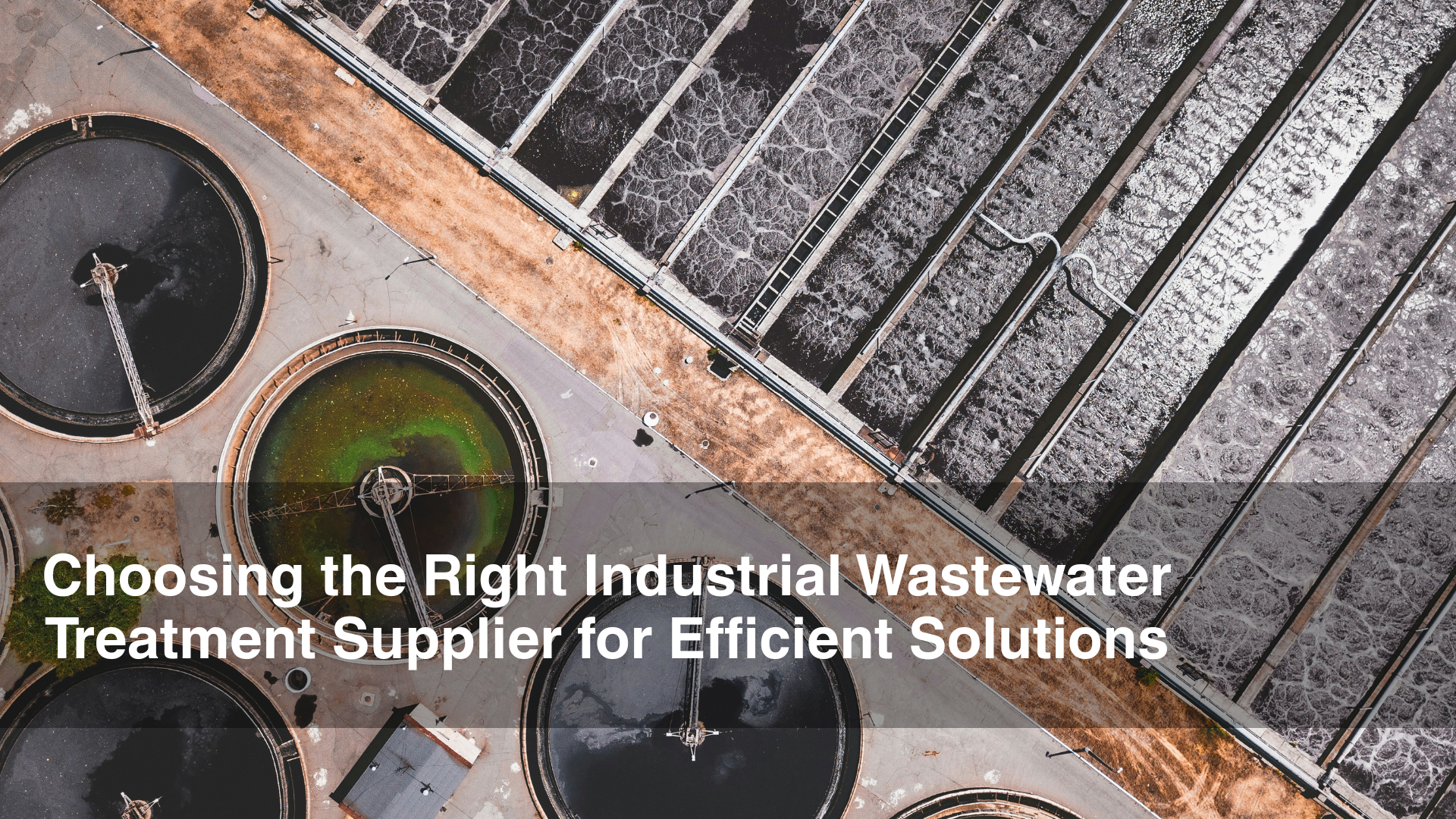Introduction to Industrial Wastewater Treatment
Industrial wastewater treatment is a crucial process that involves the removal of contaminants from wastewater generated by industrial activities. This process is essential not only for meeting compliance with local regulations but also for protecting the environment and public health. As industries grow and expand, the amount and complexity of wastewater produced have increased significantly, necessitating effective treatment strategies to mitigate harmful effects.
Various industries, including manufacturing, food processing, mining, and pharmaceuticals, generate wastewater that may contain pollutants such as heavy metals, chemicals, oils, and organic matter. Without proper treatment, these contaminants can lead to soil and water pollution, adversely impacting ecosystems and human health. Consequently, the selection of an appropriate industrial wastewater treatment supplier becomes paramount for businesses looking to implement effective solutions for wastewater management.
Effective industrial wastewater treatment typically involves a series of processes designed to remove specific contaminants based on the nature of the wastewater produced. These processes may include physical, chemical, and biological treatments, which can be tailored according to the characteristics of the wastewater in question. Generally, industrial facilities must evaluate their wastewater generation practices and identify the most suitable treatment options available in the market.
Additionally, advancements in technology have enabled many industrial wastewater treatment suppliers to offer innovative and efficient solutions. For instance, integrated systems that combine multiple treatment methods can improve overall wastewater treatment efficiency and reduce operational costs. Therefore, industries are encouraged to engage with competent suppliers that not only understand the technical aspects of wastewater treatment but also offer tailored solutions based on specific compliance requirements and environmental considerations.
The Role of Industrial Wastewater Treatment Suppliers
Industrial wastewater treatment suppliers play a critical role in managing and mitigating the impacts of wastewater produced by various industrial processes. These suppliers provide a comprehensive range of services designed to ensure that businesses can effectively treat, recycle, and discharge their wastewater in a manner that is safe and compliant with environmental regulations. The utilization of expert suppliers enables organizations to achieve efficient treatment outcomes while minimizing their environmental footprint.
One of the primary responsibilities of an industrial wastewater treatment supplier is technology selection. Suppliers assess the specific needs of their clients and recommend appropriate technologies that meet the unique demands of the wastewater generated. This may include advanced filtration systems, biological treatment processes, or chemical treatment solutions tailored to specific contaminants. By leveraging their expertise, these suppliers empower businesses to choose the most effective treatment technologies to enhance their wastewater management processes.
In addition to technology selection, suppliers are often involved in the system design of wastewater treatment facilities. This requires a thorough understanding of both the regulatory framework and the specific industrial processes involved. A well-designed treatment system not only ensures compliance but also optimizes operational efficiency. Furthermore, these suppliers assist in the installation of the treatment systems, ensuring that all components are correctly installed and function as intended.
Maintenance is another critical service provided by industrial wastewater treatment suppliers. Regular maintenance ensures that treatment systems operate effectively, reducing the risk of equipment failure and unplanned shutdowns. Moreover, suppliers often offer regulatory compliance support, guiding organizations through the complexities of local and federal wastewater regulations. By partnering with a knowledgeable industrial wastewater treatment supplier, businesses can navigate the regulatory landscape more effectively, ensuring that their operations remain compliant.
Key Factors to Consider When Selecting a Supplier
Choosing the appropriate industrial wastewater treatment supplier is crucial for businesses aiming to efficiently manage their wastewater processes. Several key factors need to be assessed to ensure the selected supplier aligns with the specific needs and objectives of the organization. One of the foremost considerations is the supplier’s experience in the industry. An established supplier with a substantial track record is likely to possess the expertise required to handle diverse complex waste streams effectively.
In addition to experience, examining the technological capabilities of the supplier is vital. The wastewater treatment industry is continuously evolving, and suppliers who employ advanced technologies and innovative solutions can optimize treatment processes, making them more cost-effective and environmentally friendly. It is advisable to inquire about their methodologies, equipment, and any proprietary technologies they might utilize, as this can significantly impact the overall efficiency of wastewater treatment.
Another essential factor is the supplier’s past performance. It is beneficial to review references and case studies that demonstrate previous successes in similar projects. These insights can provide valuable information regarding the supplier’s ability to meet deadlines, adhere to budgets, and fulfill regulatory requirements. A reliable industrial wastewater treatment supplier should be willing to share pertinent case studies that attest to their capability and reliability in delivering results.
The quality of customer support offered by the supplier also plays a significant role in the selection process. A responsive and knowledgeable support team can facilitate smoother operations and address challenges more adeptly. Lastly, evaluating the financial stability of the supplier is prudent, as this ensures that they have the resources to invest in technology and infrastructure necessary for sustainable wastewater treatment. By considering these factors, businesses can make informed decisions when selecting an industrial wastewater treatment supplier that meets their requirements efficiently.
Importance of Compliance with Regulations
The regulatory landscape surrounding industrial wastewater treatment is complex, necessitating stringent adherence to various laws and standards. Compliance with these regulations is critical for businesses that generate wastewater, as failure to meet legal obligations can result in severe consequences. Regulatory agencies impose guidelines on how wastewater must be treated before it is discharged into the environment, with the overarching aim of protecting public health and minimizing ecological disruption.
Key regulations often include the Clean Water Act in the United States, which establishes the foundation for national water pollution control programs. This act requires industrial facilities to obtain permits that dictate how much pollution can enter bodies of water, emphasizing the need for effective wastewater management strategies. Non-compliance can lead to hefty fines, legal action, or even operational shutdowns, all of which can significantly affect a business’s bottom line and reputation.
Additionally, local and state regulations may impose stricter requirements, often necessitating customized solutions not covered by broader federal standards. It is essential for industries to remain informed about the specific regulations applicable to their operations and to anticipate any forthcoming changes that could impact their wastewater treatment practices.
Partnering with a competent industrial wastewater treatment supplier can be instrumental in navigating these regulatory hurdles. A knowledgeable supplier can provide insights into compliance requirements and help develop tailored treatment solutions that not only meet regulations but also enhance operational efficiency. By leveraging the expertise of a reliable supplier, businesses can mitigate risks and ensure that their wastewater management systems are both compliant and effective in protecting the environment.
Technological Innovations in Wastewater Treatment
The landscape of industrial wastewater treatment has evolved significantly over recent years, driven by technological advancements that enhance efficiency and reduce costs. One of the forefront innovations in wastewater management is biological treatment, which utilizes microorganisms to break down organic pollutants. This method is not only environmentally sustainable but also offers a cost-effective approach to managing wastewater, which industrial wastewater treatment suppliers can effectively implement for their clients.
Another noteworthy development is the use of membrane filtration technology. This process employs semi-permeable membranes to separate contaminants from wastewater, resulting in high-quality effluent that can be reused for various applications, such as industrial processes or irrigation. The versatility and efficiency of membrane filtration systems allow businesses to comply with stringent regulatory requirements while minimizing operational costs. Collaborating with an experienced industrial wastewater treatment supplier can help organizations select the right membrane filtration system tailored to their specific needs.
Advanced oxidation processes (AOPs) represent yet another critical innovation in the field of wastewater treatment. AOPs utilize powerful oxidants to degrade complex organic pollutants that are otherwise difficult to treat. This cutting-edge technology not only enhances the degradation of contaminants but also supports the overall efficiency of the wastewater treatment process. Suppliers specializing in advanced technologies can aid businesses in adopting these innovative solutions, ensuring that they remain competitive in an increasingly regulated environment.
Incorporating these technological innovations not only improves the efficiency of wastewater treatment systems but also supports a more sustainable approach to water management. By partnering with a reputable industrial wastewater treatment supplier, businesses can navigate these advancements effectively, ensuring that they implement the most suitable technologies to meet their operational goals.
Cost-Effectiveness in Wastewater Solutions
When evaluating the financial aspects of partnering with an industrial wastewater treatment supplier, it is crucial to consider several factors that influence both initial costs and long-term savings. The upfront investment in wastewater treatment technology can be significant, encompassing equipment procurement, installation, and staff training. However, these initial costs should be balanced against the operational savings and efficiencies realized over time.
One of the primary benefits of working with a reputable wastewater treatment supplier is the potential for enhanced operational efficiencies. Modern treatment systems are designed to minimize energy consumption and reduce chemical usage, which can significantly lower ongoing operational costs. In many cases, investing in advanced technology leads to reductions in maintenance costs as well, as these systems tend to have a longer lifespan and require less frequent repairs. Furthermore, a reliable supplier often provides valuable support and expertise, allowing facilities to optimize their processes and reduce waste generation.
Long-term financial implications also play a crucial role in the decision-making process. Selecting a supplier that offers scalable and adaptable solutions enables companies to respond effectively to changing regulatory requirements and industry standards. This adaptability ensures that businesses do not incur excessive costs when striving to remain compliant with environmental regulations. Additionally, suppliers that prioritize sustainable practices can help companies improve their overall environmental performance, potentially leading to cost savings through reduced fines and better corporate reputations.
Ultimately, finding a balance between initial investments and expected economic benefits from improved treatment processes is vital. When assessing potential industrial wastewater treatment suppliers, it is essential to conduct a comprehensive cost analysis that considers both upfront expenditures and long-term financial savings to achieve optimal cost-effectiveness.
Case Studies of Successful Partnerships
In the realm of industrial wastewater management, the partnership between companies and their chosen industrial wastewater treatment supplier can significantly influence operational efficiency and compliance with environmental regulations. Various real-life case studies exemplify successful collaborations that have yielded positive outcomes for both parties involved.
One prominent example involves a manufacturing company facing difficulties in managing high levels of pollutants in its effluent stream. Selected for its expertise, the industrial wastewater treatment supplier provided a customized treatment system that addressed these specific challenges. Initially, extensive assessments were conducted to determine the composition of the wastewater. The supplier then implemented a multi-stage treatment process incorporating advanced filtration and biological treatment technologies. This collaboration not only reduced the pollutant load effectively but also enabled the company to meet regulatory standards more consistently. The significant reduction in compliance issues, coupled with lower operational costs, highlights the value of having a knowledgeable supplier by their side.
Another case study focuses on a large food processing facility that struggled with the variable nature of wastewater generated by different production lines. After engaging with a reputable wastewater treatment supplier, the facility adopted a flexible treatment approach involving modular systems that could adapt to varying effluent conditions. The supplier introduced innovative monitoring technologies that helped in real-time analysis, allowing the facility to manage treatment processes proactively. As a result, the plant reported enhanced treatment efficiency and considerable cost savings in energy consumption and maintenance practices.
Both case studies emphasize how a strategic partnership with an industrial wastewater treatment supplier can effectively address specific challenges, optimize treatment systems, and ultimately lead to improved operational outcomes. Such examples serve as valuable references for industries looking to enhance their wastewater management practices through collaboration with skilled suppliers.
The Future of Industrial Wastewater Treatment
The landscape of industrial wastewater treatment is undergoing significant transformations driven by a growing emphasis on sustainability, the adoption of circular economy practices, and advancements in digital technology. As environmental concerns escalate, industries are increasingly pressured to implement eco-friendly practices, prompting industrial wastewater treatment suppliers to innovate. This movement towards sustainability not only encourages efficient water use but also minimizes the overall environmental footprint.
One critical aspect of this evolution is the circular economy, which inherently calls for a shift from traditional linear models of consumption and waste disposal. Industrial wastewater treatment suppliers are tasked with developing solutions that allow for the recovery and reuse of water and resources from wastewater. This not only conserves water but also reduces the demand for freshwater sources, aligning with global sustainability goals. Suppliers who can provide technologies and processes that support these practices are likely to thrive in the coming years.
Moreover, the integration of digital technologies is poised to revolutionize the field of wastewater treatment. Advanced analytics, IoT devices, and automation are transforming how suppliers monitor and manage wastewater processes. These technologies facilitate real-time data collection and analysis, enabling suppliers to optimize treatment operations and improve efficiency. As more companies embrace these digital solutions, the requirements for industrial wastewater treatment suppliers will evolve, necessitating a more tech-savvy approach and the development of innovative strategies.
Additionally, the regulatory landscape surrounding wastewater management is becoming increasingly complex. Suppliers must stay abreast of changing regulations and standards that govern wastewater discharge and treatment. Proactive engagement with regulators and adaptability to compliance requirements will be essential for suppliers to maintain credibility and secure long-term partnerships with industries.
In conclusion, the future of industrial wastewater treatment will hinge on the ability of suppliers to adapt to sustainability imperatives, embrace circular economy principles, and leverage digital advancements. Consequently, choosing the right industrial wastewater treatment supplier is critical for businesses looking to navigate these dynamic changes efficiently.
Conclusion
In conclusion, the selection of the right industrial wastewater treatment supplier is a critical decision that can significantly impact a business’s operational effectiveness and compliance with environmental regulations. Throughout this discussion, we have highlighted several key considerations that should inform this choice, including the expertise of the supplier, the technologies they offer, and their ability to customize solutions to meet unique business needs.
Partnering with an experienced industrial wastewater treatment supplier can lead to numerous benefits. Not only does this ensure compliance with local regulations and standards, but it also enhances operational efficiency. By implementing advanced wastewater treatment solutions, businesses can reduce their environmental footprint, which not only aids in regulatory compliance but also contributes positively to their corporate image.
Cost savings are another significant advantage of aligning with the right supplier. Improved processes and technologies can lead to lower operational costs, as effective wastewater management reduces the need for excessive handling or disposal of waste. As businesses strive to maintain their competitive edge, optimizing wastewater management becomes paramount. This reflects the growing importance of sustainability and environmental responsibility in today’s market.
We encourage readers to evaluate their current suppliers critically. Consider their track record, technological offerings, and ability to deliver tailored industrial wastewater treatment solutions. If your current supplier does not meet these essential criteria, it may be time to explore new partnerships. Investing in a trustworthy and capable industrial wastewater treatment supplier will not only enhance management processes but also contribute to the overall success and sustainability of your business.










